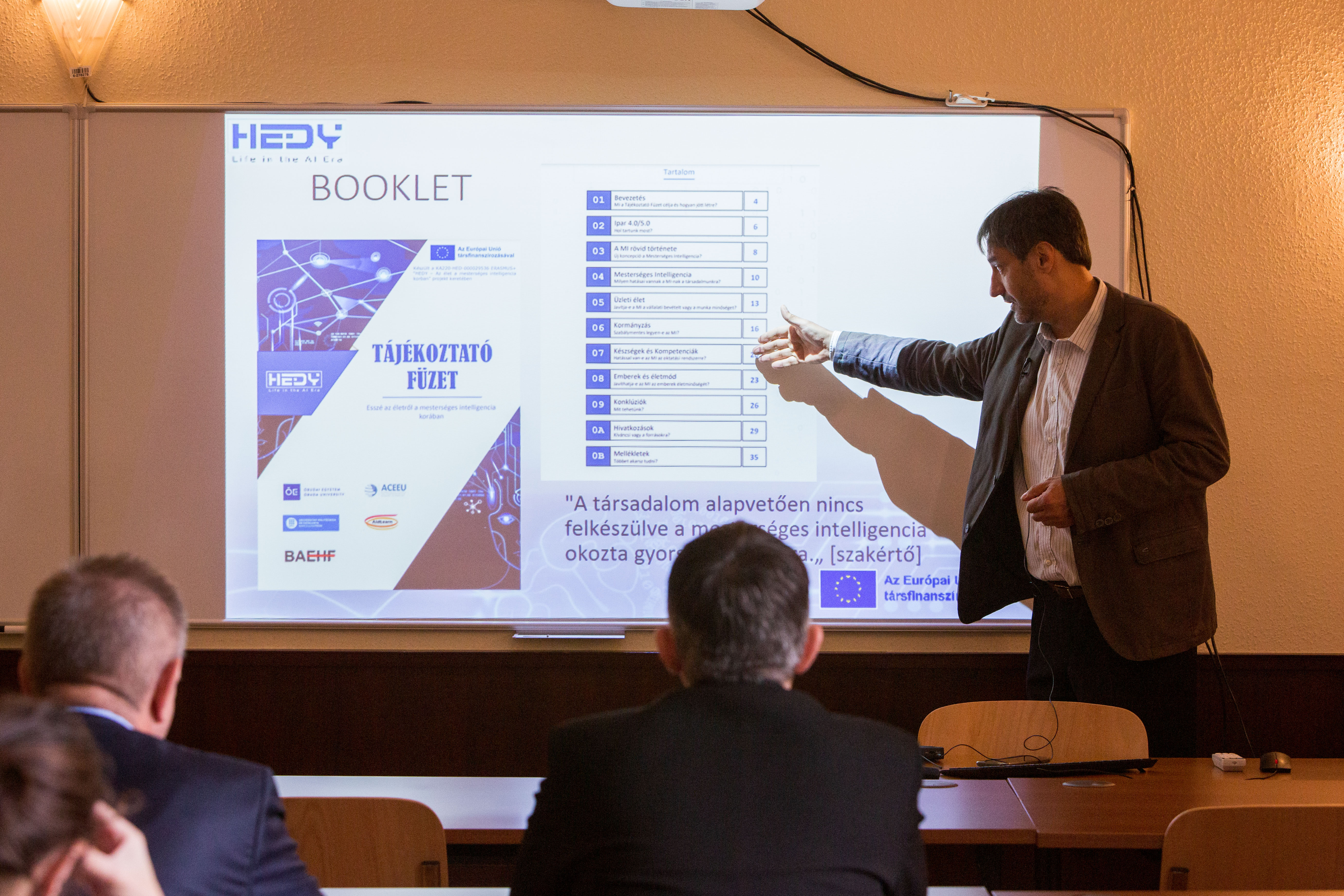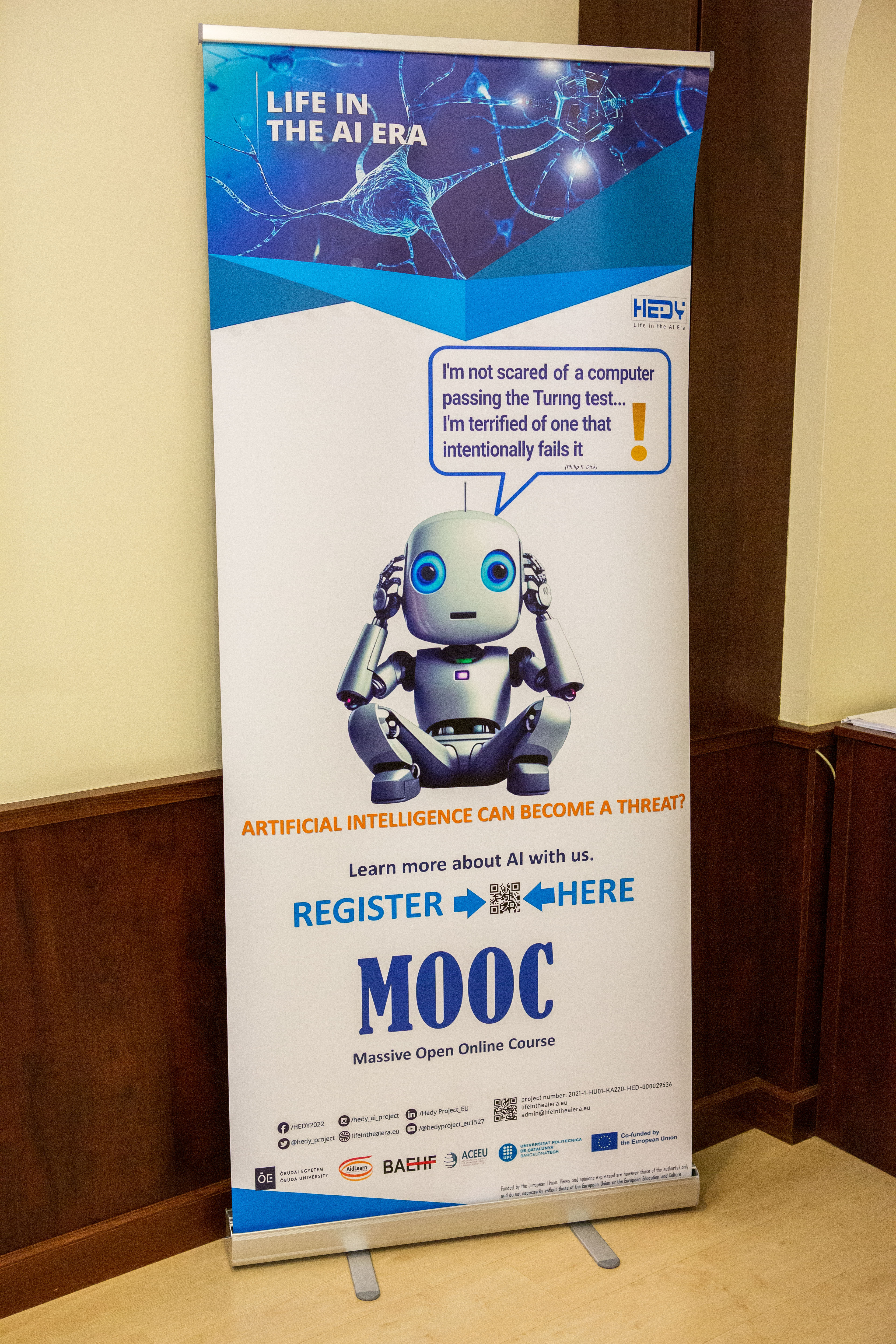
The key to successful adaptation in a world transformed by artificial intelligence.
The Hedy Project Gave us Everything we Needed to Achieve our Common Goal
Awarded Institution: Óbuda University
Project Title: Life in the AI Era (HEDY)
Interview with Dr. Habil. Szabó Gyula, professor at Óbuda University and coordinator of the Life in the AI Era (HEDY) project.
What was the goal of the HEDY project, and what activities were carried out?
The project aimed to explore the societal impacts of artificial intelligence and understand public perceptions surrounding it. In addition, we wanted to create educational content that would help university students and educators successfully adapt to a world shaped by AI. The results of our needs assessment were published in a special issue of Security Science Review, offering a unique snapshot of public opinion just before the emergence of ChatGPT. Throughout the curriculum development and pilot course phases, we redesigned our ideas several times, ultimately creating an online course that not only covers the basics but also helps users navigate the AI era with greater understanding.
What was the most memorable moment for you?
One of the most memorable moments for me was our first in-person partner meeting. Due to the pandemic, we began the project online, so a long time passed before we could finally meet face-to-face. It was a special experience to see in real life the people I had only known through a screen - to find out how tall they were, and what they looked like below the shoulders. Yet the whole meeting ran smoothly, as if we had been long-time friends and collaborators. Another defining moment came at the final meeting, when our Portuguese partner showed a summary video of the project - one minute that captured two years of excitement, effort and accomplishment.

Óbuda University presents the HEDY project
What was the project’s biggest benefit for the participants and the institution?
The project’s success reflected my colleagues’ enthusiasm: everyone strove to make the most of the opportunities to perform their work at an even higher level. The project facilitated research, participation in conferences, and publications, while also significantly enhancing our online teaching methodology and technological capabilities. Just as important was the deepening and expansion of international professional partnerships - all of which created the conditions needed to achieve our core goals.
What was the biggest internal change at the institution as a result of the project?
| During the project period, the university’s project management capabilities developed significantly. Existing structures were filled with substance, became more streamlined, and the necessary processes for implementation are now functioning more routinely. The academic content is being integrated into the faculty and university through the Artificial Intelligence Workshop led by Dr. Habil Csaba Kollár. Methodological and educational technology advances are thanks to the staff of the Office of Electronic and Digital Educational Materials, who also help disseminate these innovations to curriculum developers. |
What are you most proud of concerning the project?
I’m especially pleased that our project partners continue to reach out with new project ideas, and that the collaborations within the university have remained active. I’m also proud that our course “The Societal Impact of Artificial Intelligence” is now continuously offered through the Carpathian Basin Online Education Centre, and that more than 400 students, in both English and Hungarian versions, have expressed interest this semester alone.

How much emphasis was placed on dissemination?
Dissemination was a central element of the project. Social media, professional events, personal connections, and informing professional organizations all contributed to broadening awareness of the project’s results — not just in national languages, but in English as well. We paid particular attention to integrating into existing communities and professional processes, rather than organizing standalone events. For example, our final conference was held jointly with a cybersecurity event, offering greater visibility and more effective reach for both topics.
| The HEDY project focused on understanding the societal impacts of artificial intelligence and preparing for the challenges of the digital age. |
The goal of the international partnership was to:
- provide a comprehensive picture of AI’s impact on our lives,
- promote critical thinking, self-directed learning,
- and foster open dialogue on the topic.
The project’s outstanding quality was ensured by international collaboration, the high standard of its intellectual outputs, and its user-friendly format.
What does winning the Erasmus+ Nívódíj (Excellence Award) mean to you?
We launched the HEDY project at the same time as another initiative, the ErgoDesign project, both under a CEEPUS network collaboration. HEDY concluded in 2023, and ErgoDesign in 2024, and both received excellent evaluations and were recognized as best practices. It was a great surprise and an honour for me that the first two Erasmus+ projects I participated in as project coordinator received such recognition. It was already a huge joy to see that the project we led was even considered for the Nívódíj.
Photos: Óbuda University
Introducing the 2025 Erasmus+ Nívódíj (Excellence Award) Award-winning projects!
Last modified: 30-06-2025















